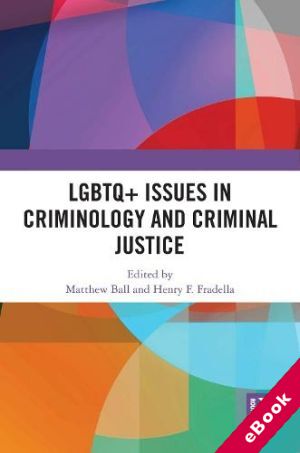
The device(s) you use to access the eBook content must be authorized with an Adobe ID before you download the product otherwise it will fail to register correctly.
For further information see https://www.wildy.com/ebook-formats
Once the order is confirmed an automated e-mail will be sent to you to allow you to download the eBook.
All eBooks are supplied firm sale and cannot be returned. If you believe there is a fault with your eBook then contact us on ebooks@wildy.com and we will help in resolving the issue. This does not affect your statutory rights.
This book presents six scholarly examinations of emerging issues in criminology and criminal justice as they impact LGBTQ+ people. It brings together contributions from leading international researchers exploring the needs of people of diverse sexual orientations and gender identities in the criminal justice context.
In addition to focusing on how sexual orientation and gender identity impact access to justice for LGBTQ+ persons, the book also explores how to improve the work of justice practitioners, policing, and corrections in ways that address the unique needs of LGBTQ+ clients. Specific chapters include: a study of support for myths about male rape victims and how indicators of intolerance might shape such beliefs; two examinations of police responses to same-sex intimate partner violence, including an exploration of the role of mandatory arrest policies; an investigation into the barriers LGBTQ+ people face when attempting to access police liaison officers; an analysis of how media coverage framed the 2016 Pulse nightclub shooting in Orlando, Florida; and suggestions for creating safer and more effective interventions for LGBTQ+ women and girls who are correctional clients.
LGBTQ+ Issues in Criminology and Criminal Justice
will be a key resource for academics, researchers, and advanced students of criminology and criminal justice, law, victimology, policing, corrections, research methods, sociology, and media studies.The chapters in this book were originally published in the journal Criminal Justice Studies.